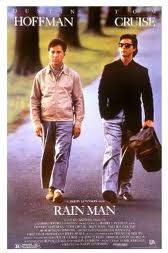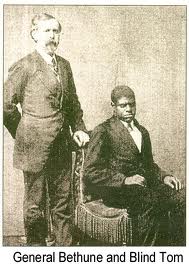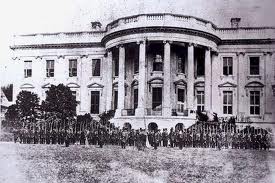 RAIN MAN, the movie won four Oscars for the depiction of a greedy, selfish, upwardly mobile (Yuppy), Charlie, whose business life is spinning out of control and his dead father’s large fortune is just the ticket he needs to turn things around. The only problem is, his older brother, Ray, the one he vaguely remembers, who happens to be mentally and emotionally challenged. The yuppy discovers his brother has a way with numbers and statistics, a phenomenal, extraordinary way with numbers and decides that skill could be used to his benefit, especially since their father left the fortune to Ray.
RAIN MAN, the movie won four Oscars for the depiction of a greedy, selfish, upwardly mobile (Yuppy), Charlie, whose business life is spinning out of control and his dead father’s large fortune is just the ticket he needs to turn things around. The only problem is, his older brother, Ray, the one he vaguely remembers, who happens to be mentally and emotionally challenged. The yuppy discovers his brother has a way with numbers and statistics, a phenomenal, extraordinary way with numbers and decides that skill could be used to his benefit, especially since their father left the fortune to Ray.
The real life Rain Man was Kim Peek. He performed poorly on standardized tests, scoring below average, but he was discovered to possess a photographic memory. Unlike the character in the movie “…Babbitt, Peek was not autistic[4] and likely had FG syndrome.” (Wikepedia: en.wikipedia.org/wiki/Kim_Peek)
The great classical music slave prodigy, Thomas Bethune, was indeed autistic and much like the fictional character Ray, was left alone, thought to be worthless, yet turned out to be a diamond in the ruff for his master Colonel James Bethune. Given the stage name “Blind Tom,” Thomas was socially awkward at times, but extremely confident, if not arrogant when  it came to his musical genius. He reportedly enjoyed the positive attention he received from performing and demanded perfection when it came to his pianos as well as the musicians who joined him on stage.
it came to his musical genius. He reportedly enjoyed the positive attention he received from performing and demanded perfection when it came to his pianos as well as the musicians who joined him on stage.
Other Famous autistic savants, as listed in Wikepedia
Alonzo Clemons, American clay sculptor [31]
Tony DeBlois, blind American musician [32]
Leslie Lemke, blind American musician [33]
Jonathan Lerman, American artist [34]
Thristan Mendoza, Filipino marimba prodigy [35]
Jerry Newport is an author, savant, and has Asperger’s. His wife, Mary Newport, is also a savant on the autistic spectrum [36]
Derek Paravicini, blind British musician [37]
James Henry Pullen, gifted British carpenter [38]
Matt Savage, U.S. autistic jazz prodigy [39]
Henriett Seth-F., Hungarian autistic savant, poet, writer and artist







